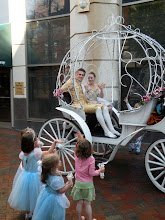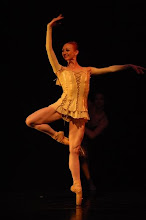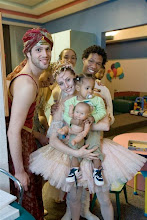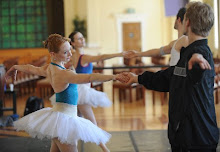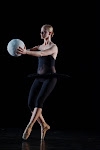As Emily’s and Lasso’s work evolved, they reached out to the musical life in Memphis to listen carefully to what our community could bring to their search. The dancers are asked to give very internal, individual responses to the music and then take that feeling and widen it as they dance in groups. Lasso’s experience in Africa, Emily’s in the U.S., and the work built in Memphis are all steps in a process Emily and Lasso are producing at Yale University and in Burkina Faso. Now, they have added Ballet Memphis – and we are glad to support them. I would say that their deliberate, thoughtful process itself is a manifestation of work in community, among people reaching across barriers to go forward to create avenues of understanding.
Jane Comfort’s new premiere I Will Follow Him: A Brief History closes our program with a romp through the women’s story since 1950, and part of her preparation was Susan Douglas’ work Where the Girls Are and Gail Collins recent best-seller, When Everything Changed. For many of us, this will be a trip down memory lane, and a birthday celebration of sorts. But look carefully, and think carefully. How much more must be done? What do we expect of ourselves, of our daughters, our partners, our leaders? Who is listening? Who is seeing? What are we saying? How are we, in effect, continuing to present ourselves? According to us, according to others? Are we continuing to encourage both men and women, all children, all people, to support one another’s dreams and journeys?
If we believe our work as supporters of one another in different kinds of community is important, how do we help our nation look at community as something just as important as self? Are there glass ceilings because community still isn’t valued as much as the solo winner, pushing self forward above all else? Is there still too much “winner take all” mentality rather than “how can all become winners?”
I mentioned earlier “a place at the table.” The kind of table we set, and whom is seated there has mattered very much in our culture. We find women and men of all races now around our dinner tables, corporate conference tables, and operating tables. This is something all Americans can be proud of. We celebrate that progress together and still keep in mind that there are still many not at the feast. Let us keep creating, attending and supporting art that remembers this. Let’s support those journeys of new voices, new ideas, and expand the number of seats at our tables. Let’s make room for the voices which may be less powerful, and hear what they have to say. Let’s learn that those who are busy taking care of others are busy supporting us all.
Wednesday, February 9, 2011
Wednesday, February 2, 2011
Ask yourself this... part 1
Ballet Memphis has a core value of creating work that has meaning, and another core value that everyone in our society matters. Therefore, issues around who has a place at the table continue to be thread through the tapestry of performances we produce. This AbunDANCE: Where the Girls Are 2 is a part of an important national conversation, and naturally of great interest to me as I look back on the 24 years of our Ballet Memphis journey, plan for our future, and continue to make sure that what we do in our community has artistic, conceptual merit, and touches the deep concerns of the people with whom we live.
Today, more than half of the students in universities are women. In law school and medical school, the numbers are also reflecting this trend. Yet in ballet, there are only four women who direct fully developed, nationally respected ballet companies. How is this, when the great preponderance of young ballet students and their teachers are female? The voice of women in our field still needs nurturing, and serious questions need to be asked about patriarchal hierarchy and unconscious acceptance of old practices, attitudes and decisions.
In our performances in this two week run, you are seeing examples from some of the most thoughtful women in dance creation. Another work is a deeply personal creation by a former member of our company about the women who raised him in the Baltimore projects. There is also a fusion project between Emily Coates and Lacina Coulibaly of Burkina Faso which has in part evolved into a work that reflects women’s strength in supporting community.
Support is a rich word. It implies an ability to leave one’s self and assist another. In Kate Chopin's The Awakening, choreographed by our new Artistic Associate, Julia Adam, Edna cannot find a way to discover feelings and express her need to lead a life of her own; her conventional society exacerbates her yearning, her sense of living a caged life, and she tragically sees no way out of her sorrow. The palette of the work is pastel, yet that very softness points out how lost she is, how unclear her options seem.
Damien Patterson’s Four Women homage to the women who raised him points out a different time, a different place, built on the backdrop of the racial and gender struggle in America which he has known. These women supported one another, and it is this support from which they drew their strength.
Today, more than half of the students in universities are women. In law school and medical school, the numbers are also reflecting this trend. Yet in ballet, there are only four women who direct fully developed, nationally respected ballet companies. How is this, when the great preponderance of young ballet students and their teachers are female? The voice of women in our field still needs nurturing, and serious questions need to be asked about patriarchal hierarchy and unconscious acceptance of old practices, attitudes and decisions.
In our performances in this two week run, you are seeing examples from some of the most thoughtful women in dance creation. Another work is a deeply personal creation by a former member of our company about the women who raised him in the Baltimore projects. There is also a fusion project between Emily Coates and Lacina Coulibaly of Burkina Faso which has in part evolved into a work that reflects women’s strength in supporting community.
Support is a rich word. It implies an ability to leave one’s self and assist another. In Kate Chopin's The Awakening, choreographed by our new Artistic Associate, Julia Adam, Edna cannot find a way to discover feelings and express her need to lead a life of her own; her conventional society exacerbates her yearning, her sense of living a caged life, and she tragically sees no way out of her sorrow. The palette of the work is pastel, yet that very softness points out how lost she is, how unclear her options seem.
Damien Patterson’s Four Women homage to the women who raised him points out a different time, a different place, built on the backdrop of the racial and gender struggle in America which he has known. These women supported one another, and it is this support from which they drew their strength.
Subscribe to:
Posts (Atom)






